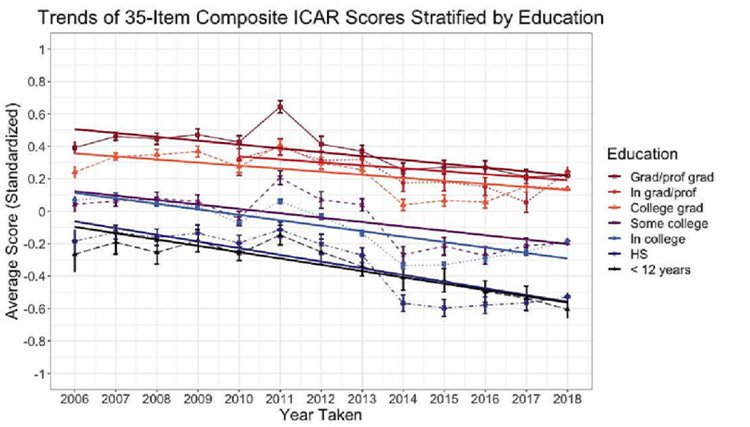A new study found a sharp decline in American IQ scores in recent years, offering support for what researchers term the “Reverse Flynn Effect.”
Examining a large U.S. sample, researchers from Northwestern University found that IQ ability scores in three of four key categories dropped between 2006 and 2018. Composite ability scores (single scores derived from multiple pieces of information) were also lower in recent samples.
While a decline in IQ scores may sound alarming, researchers caution that the results do not mean Americans are becoming less intelligent.
“It doesn’t mean their mental ability is lower or higher; it’s just a difference in scores that are favoring older or newer samples,” said Dr. Elizabeth Dworak, a research assistant professor of medical social sciences at Northwestern University Feinberg School of Medicine and lead author of the new study.
“It could just be that they’re getting worse at taking tests or specifically worse at taking these kinds of tests.”
Additionally, researchers did find that American scores in the fourth key IQ category, spatial reasoning, had generally increased from 2011 to 2018.
Ultimately, results support a global decline in IQ scores beginning in the 1990s and 2000s. This phenomenon has become known as the “Reverse Flynn Effect.”
In his seminal 1984 study, American-born New Zealand intelligence researcher Dr. James Flynn found that beginning in the early 1930s, fluid and crystallized intelligence test scores have steadily increased in most of the world’s population.
Following Dr. Flynn’s initial work, the global increase in IQ test scores for most of the 20th century has been confirmed and termed the “Flynn Effect.”
And while the increase in intelligence test scores has been well documented, the exact reasons for the Flynn Effect remain one of modern psychology’s most ubiquitous and mysterious phenomena.
Because the Flynn Effect has been observed occurring over only a few generations, the increase in IQ scores cannot be attributed to genetic evolution. Instead, social scientists have concluded the basis for the phenomenon must stem from environmental factors. Since these increases have been recorded globally, outside factors cannot be entirely attributed to cultural or national influence.
Some of the proposed explanations for the Flynn Effect include:
- Increased familiarity with standardized testing
- The modern world generally being a more complex and stimulating environment.
- Improved nutrition and physical health.
- Reduction of lead in commercial products like gasoline and paint. In particular, one study found that a drop in lead level in the U.S. from the 1970s to 2007 correlated with a 4-5 point increase in IQ.
After over a half-century of people becoming mysteriously smarter, recent research has unexpectedly revealed that global IQ scores seemingly peaked in the 1990s and have been in steady decline ever since.
Studies examining sample populations from Norway, Denmark, Australia, Britain, the Netherlands, Sweden, Finland, and now the United States have all shown statistically significant declines in IQ scores.
Scientists have termed this enigmatic IQ score decrease the “Reverse Flynn Effect.”


This recent research represents the first time the Flynn Effect has been explored using twenty-first-century IQ scores in the United States.
Using data collected by the Synthetic Aperture Personality Assessment Project and International Cognitive Ability Resource, researchers explored intelligence ability scores of a U.S. sample size of 394,378 persons from 2006-2018.
Results revealed a decline in intelligence scores in verbal reasoning, matrix reasoning, and letter and number series. This decline was uniform across all sample groups, regardless of the test taker’s age, gender, or education.
Despite the noted decline, researchers did find IQ scores related to spatial reasoning, or the ability to visualize 3D objects and draw conclusions based on limited information, had increased during this time.
Ultimately, researchers say the results demonstrate a pattern consistent with the Reverse Flynn Effect in three of four categories associated with cognitive ability, with a potential positive Flynn effect in spatial reasoning.
As with the Flynn Effect, the causes for the Reverse Flynn Effect are widely believed to be environmental. However, the exact reasons for lowering IQ scores remain obscure.
Some proposed explanations for the Reverse Flynn Effect are:
- Increased air pollution
- Worsening nutrition and health standards
- Worsening educational values and school systems
- The proliferation of information systems (E.g., TV, the internet, social media, etc.) creates less intelligently stimulating environments.
The phenomenon’s namesake, Dr. Flynn, has suggested the decrease in teenage IQ scores in the United Kingdom could be “due to youth culture having “stagnated” or even dumbed down.”
Some notably controversial academics, like psychologist Richard Lynn, have tried to use the Flynn Effect as “evidence” to support pseudoscientific theories associated with biological racism or white racial superiority.
The Reverse Flynn Effect has been similarly co-opted by anti-immigration movements and pseudoscientific dysgenic or eugenic racist theories.
However, a wealth of research, including in-depth within-family studies, has overwhelmingly demonstrated that race, culture, ethnicity, or gender do not influence the positive or Reverse Flynn Effect.
Researchers point out that since one of four key IQ ability categories increased over the 12-year period, it suggests more is at play than simply assuming people are becoming less intelligent.
“There’s debate about what’s causing it, but not every domain is going down; one of them is going up,” said Dr. Dworak. “If all the scores were going in the same direction, you could make a nice little narrative about it, but that’s not the case. We need to do more to dig into it.”
“A shift in perceived values in society also might have affected scores,” added Dr. Dworak. “If you’re thinking about what society cares about and what it’s emphasizing and reinforcing every day, there’s a possibility of that being reflected in performance on an ability test.”
In a press release by Northwestern University, Dr. Dworak suggested that the emphasis on STEM (science, technology, engineering, and math) education in recent decades could mean other areas, like abstract reasoning, are receiving less attention in schools.
Another explanation for the Reverse Flynn Effect could rest on the ability of IQ tests to accurately measure the type of intelligence needed to be successful in the modern era.
A significant criticism of IQ tests is their ignoring different skills and knowledge that translate to success in human societies. Notable researchers, like Dr. Wayne Weiten and Dr. Keith Stanovich, have argued that IQ tests are only valid in measuring the type of cognitive ability needed to do well in academic work while failing to broadly assess human intelligence.
In hopes of answering some of these pressing questions, Dr. Dworak and her colleagues at Northwestern are currently examining a dataset containing 40 years of IQ test results for a follow-up study.
Looking for Flynn effects in a recent online U.S. adult sample: Examining shifts within the SAPA Project was recently published in the journal Intelligence.
Tim McMillan is a retired law enforcement executive, investigative reporter and co-founder of The Debrief. His writing typically focuses on defense, national security, the Intelligence Community and topics related to psychology. You can follow Tim on Twitter: @LtTimMcMillan. Tim can be reached by email: tim@thedebrief.org or through encrypted email: LtTimMcMillan@protonmail.com

